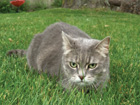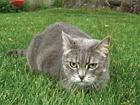Cats have allergies too
(NNA) -- With the onset of fall, people across the country begin to feel the effects of outdoor seasonal allergens. Sneezing, watery eyes, stuffy nose and even serious respiratory difficulties are all symptoms allergy sufferers know all to well. But did you know that like people, our feline friends can suffer from allergies?
Much like in the human population, the occurrence of allergies in pets seems to be on the rise. Cats show comparable allergy symptoms to humans, even to the point of developing asthma. Pet allergies fall into three main categories: food allergy, an allergic reaction to an ingredient in a pet's food; flea allergic dermatitis, or "flea bite hypersensitivity"; and lastly, atopy, an environmental allergy.
Atopy in pets is the most unfamiliar type of pet allergy. Just like humans, cats can suffer an allergic reaction to airborne substances such as dust, pollen or molds. Depending on the allergen, or agent causing the allergic reaction, your cat may demonstrate symptoms seasonally, such as in the case of pollen, or year-round, as in the case of dust or molds. More information is available online at www.kittyallergies.com.
Many people have long blamed pets, particularly cats, for causing allergies and breathing problems in people. However, in the past few years, scientists have found that humans may be introducing agents triggering asthma in cats. Dusty houses, human dandruff, chemicals, artificial fragrances and certain types of cat litter can all create serious inflammation in the airways and worsen cats' asthma.
With a rising number of cats suffering from feline asthma, which causes shortness of breath, wheezing and coughing, the condition is fairly common. Once your cat is diagnosed with feline asthma, you have several treatment options depending on the severity of the case. The first step is to try and eliminate any environmental allergens that are causing respiratory distress in your cat. Look closely at your current cat litter. The dust that rises from clay litters as well as the artificial fragrances used in silica litter, can wreak havoc on a cat with allergies or feline asthma. Make the switch to an all-natural, fragrance free, dust free cat litter, such as a Feline Pine. Also eliminate firewood smoke, clean up mildew and mold, and vacuum often.
Comments
There are 0 comments on this post





